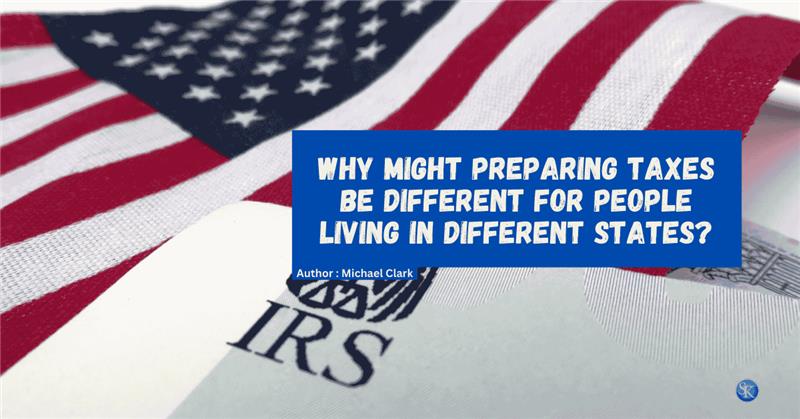
Why Might Preparing Taxes be Different For People Living in Different States?
Preparing taxes is different in every state because each state has its own tax laws, income tax rules, deductions, credits, and tax systems. Some states collect income tax, some don’t, and others tax only certain types of income. These differences directly shape the way residents file their taxes, calculate what they owe, and determine their refund.
How State Tax Systems Create Different Filing Rules
Every American files a federal tax return, but state tax rules vary widely. Some states have income tax, others use flat tax rates, and a few charge no income tax at all. Because of this, the information you provide and the forms you submit depend heavily on where you live.
Your state may also offer unique deductions or credits that the federal government does not, which changes the way your final tax calculation looks.
How State Income Tax Affects Your Tax Preparation
States With No Income Tax
States such as Florida, Texas, Tennessee, and Nevada do not collect state income tax. Residents only file federal returns, making tax preparation simpler. However, these states often rely on higher sales tax or property tax to generate revenue.
Flat Tax States
States like Colorado and Illinois tax all income at one flat rate. This keeps the filing process simple but doesn’t account for differences in income levels.
Progressive Tax States
States like California, New York, and New Jersey tax higher earners at higher rates. This increases the complexity of filing and often leads to larger tax bills for residents in high-income brackets.
How State Deductions and Credits Change Your Tax Result
Each state decides which deductions and credits residents can claim. This often leads to big differences in how much a taxpayer owes or receives back.
Homeowner and Property Tax Credits
States such as New Jersey and California allow residents to claim property tax relief. States with no income tax do not offer these credits.
Education Credits
Some states, like Indiana, offer tuition credits or education savings incentives.
Green Energy Incentives
States such as Oregon reward homeowners for installing solar panels or energy-efficient upgrades.
These differences can significantly reduce or increase your tax bill depending on where you live.
Best CPA pricing in Tampa, FL, US
Sales Tax and Use Tax Rules Also Affect Your Return
Sales tax rules vary between states, and these rules affect how much you must report each year.
Tax-Free Essentials
Some states do not tax groceries or medicine. Others tax them at the full rate, increasing your cost of living.
Online Purchases
If you shop online and no sales tax is charged, some states require you to report use tax on your return.
Border Shopping
Residents near state borders may shop in neighboring states to save money, but may still owe taxes to their home state when filing.
Sales Tax Holidays
Some states offer tax-free weekends for school supplies, clothing, or electronics. Others do not, affecting annual tax savings.
Why Some States Have Higher Taxes Than Others
State tax laws reflect local needs and economics.
For example:
-
Tourism states (Hawaii, Nevada) rely heavily on hotel and sales taxes.
-
High-cost states (California, New York) charge higher income taxes but offer more deductions.
-
Agricultural states offer unique tax breaks for farm income and equipment.
These differences explain why taxpayers in one state may owe far more or far less than someone in another state who earns the same income.
How Your State Can Increase or Reduce Your Refund
Your state can affect your tax refund in several ways:
-
Allowing extra deductions (property tax relief, education credits)
-
Offering refundable or non-refundable credits
-
Providing commuter or renter tax benefits
-
Exempting Social Security or retirement income
Two people earning the same income can have very different refunds depending on state-specific benefits.
Why Moving Between States Complicates Tax Filing
If you move during the year, you may have to:
-
File part-year resident returns in both states
-
Split income earned in each state
-
Apply two different sets of tax rules
-
Use reciprocal agreements if you work in one state but live in another
An incorrect split can cause double taxation or missed refunds.
Do Retirees Pay Different Taxes in Different States?
Yes. States differ widely in how they tax retirement income.
Examples:
-
Florida and Nevada do not tax retirement income.
-
Colorado taxes some but exempts a portion.
-
California taxes most retirement income fully.
These differences often influence where retirees choose to live.
Conclusion
Where you live has a direct impact on how you file taxes and how much you owe. State laws change every year, so keeping up with new rules can be challenging. We helps individuals and families understand these differences so they can file correctly and avoid overpaying. Whether you live in a no-tax state, a high-tax state, or recently moved, expert guidance ensures your return is accurate and optimized.
FAQs
1. Why do some states not require a state income tax return?
Because those states fund government programs through sales tax, tourism taxes, or higher property taxes instead of income tax.
2. Do I need to file taxes in two states if I moved mid-year?
Most likely yes. You file a part-year return for each state you lived in.
3. Are online purchases taxed by every state?
If sales tax wasn’t collected at checkout, many states require you to pay “use tax” on your return.
4. Why is my refund different after moving to another state?
Your new state may have different tax rates, credits, or deduction rules, which change your final refund.
5. Can state tax laws change every year?
Yes. Many states update brackets, credits, and exemptions annually, which affects how much you owe.
Follow SKFinancial on Facebook / Twitter / Linkedin / Youtube for updates.














